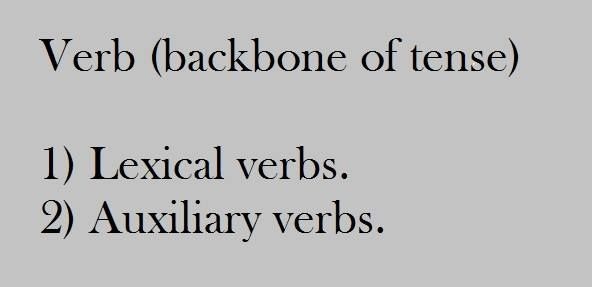We talk about tenses but here I want to discuss about verbs first because when we understand verb then tenses becomes quite easy to be learnt.
There are two main types of verbs:-
1) Lexical verbs
2) Auxiliary verbs.
Lexical verbs:-
Lexical verb is the main verb in the sentence which shows actual action of subject.There are uncountable number of lexical verbs.
some of the examples are:-
eat, drink, walk, teach and the list continues.
There is 5 possible forms of a lexical or main verb.
first form, second form , third form, s/es form and ing form.
for example if take the verb eat, these are the 5 possible forms of it.
Eat:-
first form = eat.
second form = ate.
third form = eat.
s/es form = eats.
ing form = eating.
Now let's talk about auxiliary verbs.
Auxiliary verbs are also called helping verbs. These usually tell us about the type of the tense. I am telling you all the auxiliary (helping) verbs and grouping them by nature.
1) has, have, had.
2) am, is , was , were, has been, have been, had been, will be, shall be.
3) will , would, can, could, shall , should , may , might.
4) do, does, did.
(Note: I might have forgot any auxiliary verb, if I remember them I will add them also)
I have grouped these auxiliary or helping verbs together because the main verb used after the auxiliary verb of any of these four is same.
For example take group 1 (has,have,had) when we use any of these helping verb in a sentence we always use third form of main verb with them like she has eaten, similarly if we use have or had, we also use third form of main verb.
when we use helping verb of 2 group we always use "ing" form of main verb.
when verb of any group 3 is used anywhere in sentence we use, first form of the main verb.
group 4 of auxiliary verbs are not used in simple sentence, I will explain their uses in tenses.
If you guys have any question, feel free to ask.




